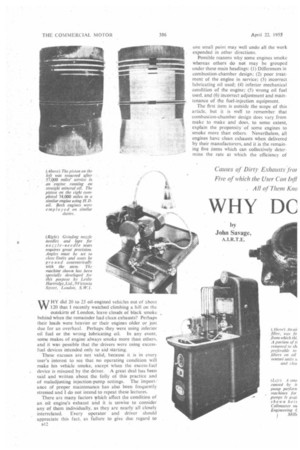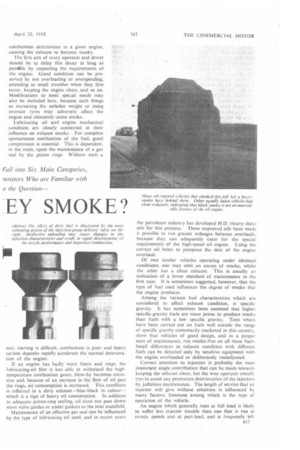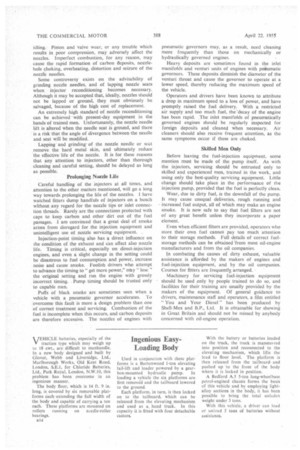WHY DC EY SMOKE?
Page 46

Page 47

Page 48

If you've noticed an error in this article please click here to report it so we can fix it.
WHY did 20 to 25 oil-engined vehicles out of about 120 that I recently watched climbing a hill on the outskirts of London, leave clouds of black smoke behind when the remainder had clean exhausts? Perhaps their loads were heavier or their engines older or just due for an overhaul. Perhaps they were using inferior oil fuel or the wrong lubricating oil. In any event, some makes of engine always smoke more than others, and it was possible that the drivers were using excessfuel devices intended only to aid starting.
These excuses are not valid, because it is in every user's interest to see that no operating condition will make his vehicle smoke, except when the excess-fuel device is misused by the driver. A great deal has been said and written about the folly of this practice and of rnaladjusting injection-pump settings. The importance of proper maintenance has also been frequently stressed and I do not intend to repeat these lectures.
There are many factors which affect the condition of an oil engine's exhaust and it is unwise to consider any of them individually, as they are nearly all closely interrelated. Every operator and driver should appreciate this fact, as failure to give due regard to seal, starting is difficult, combustion is poor and heavy carbon deposits rapidly accelerate the normal deterioration of the engine.
If an engine has badly worn liners and rings, the lubricating-oil film is less able to withstand the hightemperature combustion gases; blow-by becomes excessive and, because of an increase in the flow Of oil past the rings, oil consumption is increased. This condition is reflected in a dirty exhaust—blue-black in colour--which is a sign of heavy oil consumption. In addition to adequate piston-ring sealing, oil.must not pass down worn valve guides or under gaskets to the inlet manifold.
Maintenance of art effective gas seal can be influenced by the type of lubricating oil used, and in recent years
the petroleum industry has developed H.D. (heavy dutyi oils for this purpose. These improved oils have made it possible to run greater mileages between overhauls,
because they can adequately cater for the special requirements of the high-speed Oil engine. Using the correct oil helps to postpone the date of the engine overhaul.
Of two similar vehicles operating under identical conditions, one may emit an excess of smoke, whilst the other has a clean exhaust. This is usually an indication of a lower standard of maintenance in the first case. It is sometimes suggested, however, that the type of fuel used influences the degree of smoke that the engine produces.
Among the various fuel characteristics which are considered to affect exhaust condition, is specific gravity. It has sometimes been assumed that higher specific-gravity fuels are more prone to produce smoke than fuels with a low specific gravity. Tests which have been carried out on fuels well outside the range of specific gravity customarily marketed in this country. show that vehicles of good design, and in a proper state of maintenance, run smoke-free on all these fuels. Small differences in exhaust condition with different fuels can be detected only by sensitive equipment with the engine overloaded or deliberately maladjusted.
Correct attention to injectors is probably the most important single contribution that can be made towards keeping the exhaust clean, but the wise operator usually trys to avoid any premature deterioration of the injectors by judicious maintenance. The length of service that an injector will give without attention is influenced by many factors, foremost among which is the type of operation of the vehicle.
An engine which generally runs at full load is likely to suffer less injector trouble than one that is run at erratic speeds and at part-load, and is frequently left idling.. Piston and valve wear, or any trouble which results in poor compression, may adversely affect the nozzles. Imperfect combustion, for any reason, may cause the rapid formation of carbon deposits, nozzlehole choking, overheating, distortion and seizure of the nozzle needles.
Some controversy exists on the advisability of grinding nozzle needles, and of lapping nozzle seats when injector reconditioning becomes necessary. Although it may be accepted that, ideally, nozzles should not be lapped or ground, they must obviously be salvaged, because of the high cost of replacement.
An extremely high standard of nozzle reconditioning can be achieved with present-day equipment in the hands of trained men. Unfortunately, the nozzle needle lift is altered when the needle seat is ground, and there is a risk that the angle of divergence between.the needle and seat will be modified.
Lapping and grindingof the nozzle needle or seat remove the hard metal skin, and ultimately reduce the effective life of the nozzle. It is for these reasons that any attention to injectors, other than thorough cleaning and careful letting, should be delayed as long as possible.
Prolonging Nozzle Life Careful handling of the injectors at all times, and attention to the other matters mentioned, will go a long way towards prolonging the life of the nozzles_ I have watched fitters dump handfuls of injectors on a bench without any regard for the nozzle tips or inlet connection threads. Rarely are the connections protected with caps to keep carbon and other dirt out of the fuel passages. I am convinced that a great deal of smoke arises from disregard for the injection equipment and unintelligent use of nozzle servicing equipment. _
Injection-point timing also has a direct influence on the condition of the exhaust and can affect also nozzle life. Tinting is critical, especially on direct-injection engines, and even a slight change in the setting could be disastrous to fuel consumption and power, increase noise and cause smoke. Foolish drivers who attempt to advance the timing to "get more power," may" lose" the original setting and run the engine with grossly incorrect timing. . Pump timing should be trusted only to capable men.
Puffs of black smoke are sometimes seen when a vehicle with a pneumatic governor accelerates. To overcome this fault is more a design problem than one of correct treatment and servicing. Combustion of the fuel is incomplete when this occurs, and carbon deposits are therefore excessive. The nozzles of engines with pneumatic governors may, as a result, need cleaning more frequently than those on mechanically or hydraulically governed engines.
Heavy deposits are sometimes found in the inlet manifolds and venturi units of engines with pneumatic governors. These deposits diminish the diameter of the venturi throat and cause the governor to operate at a lower speed, thereby reducing the maximum speed of the vehicle.
Operators and drivers have been known to attribute a drop in maximum speed to a loss of power, and have promptly raised the fuel delivery. With a restricted air supply and too much fuel, the decay of the engine has been rapid. .The inlet manifolds of pneumatically governed engines should be regularly inspected for foreign deposits and cleaned when necessary. Air cleaners should also receive frequent attention, as the same symptoms occur if these are choked.
Skilled Men Only
Before leaving the fuel-injection equipment, some mention must be made of the pump itself. As with the injectors, servicing should be entrusted only to skilled and experienced men, trained in the work, and using only the best-quality servicing equipment. Little change should take place in the performance of the injection pump, provided that the fuel is perfectly clean_ Wear, due to dirty fuel, is the downfall of the pump_ It may cause unequal deliveries, rough running and increased fuel output, all of which may make an engine smoke. It is now safe to say that fuel filters are not of any great benefit unless they incorporate a paper element.
Even when efficient filters are provided, operators who store their own fuel cannot pay too much attention to their storage methods. Full details of correct fuelstorage methods can be obtained 'from most oil-engine manufacturers and from the oil companies.
In combating the causes of dirty exhaust, valuable assistance is afforded by the makers of engines and fuel-injection equipment, and by the oil companies. Courses for fitters are frequently arranged.
Machinery for servicing fuel-injection equipment should be used only by people trained to do so, and facilities for their training are usually provided by the makers of the equipment. Of general guidance to drivers, maintenance staff and operators, a film entitled "You and Your Diesel" has been produced by Shell-Mex and B.P., Ltd. It is obtainable for showing in Great Britain and should not be missed by anybody concerned with oil-engine operation.




























































































